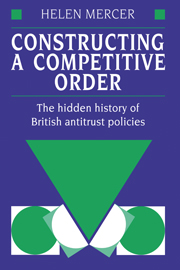Book contents
- Frontmatter
- Contents
- List of tables
- Acknowledgements
- Notes on conventions and abbreviations
- 1 Introduction
- 2 The British cartel system, 1880–1964
- 3 The state and the ‘monopoly problem’, 1880–1939
- 4 The war and the White Paper, 1940–44
- 5 The origins of the Monopolies and Restrictive Practices Act, 1948
- 6 Interpretation of policy – the Monopolies and Restrictive Practices Commission, 1949–56
- 7 The origins of the Restrictive Trade Practices Act 1956 – a re-interpretation
- 8 Resale price maintenance
- 9 Conclusions
- Appendixes
- Notes
- Bibliography
- Index
3 - The state and the ‘monopoly problem’, 1880–1939
Published online by Cambridge University Press: 29 January 2010
- Frontmatter
- Contents
- List of tables
- Acknowledgements
- Notes on conventions and abbreviations
- 1 Introduction
- 2 The British cartel system, 1880–1964
- 3 The state and the ‘monopoly problem’, 1880–1939
- 4 The war and the White Paper, 1940–44
- 5 The origins of the Monopolies and Restrictive Practices Act, 1948
- 6 Interpretation of policy – the Monopolies and Restrictive Practices Commission, 1949–56
- 7 The origins of the Restrictive Trade Practices Act 1956 – a re-interpretation
- 8 Resale price maintenance
- 9 Conclusions
- Appendixes
- Notes
- Bibliography
- Index
Summary
The rise of monopoly produced far-reaching departures in economic thought and in political and legal theory. In his classic work on the separation of ownership and control in the running of the large-scale corporation, A.A. Berle wondered ‘Must we not … recognise that we are no longer dealing with property in the old sense?’ The implications for the principle of laissez-faire were quickly apparent. Mid-nineteenth century political and economic orthodoxy may be summed up in J.S. Mill's dictum that
in all the more advanced communities the great majority of things are worse done by the intervention of government, than the individuals most interested in the matter would do them, or cause them to be done, if left to themselves.
By 1914 the state was already involved in social legislation: the rise of monopoly was to challenge Mill's precept in the business sphere also.
State and monopoly: theoretical positions
Before 1914 four main theoretical positions on the role of the state in relation to the ‘trusts’ may be isolated. The dominant strand was the neoclassical school. It derived from a positive assessment of new technical methods requiring developments in business organisation. Indeed, Marshall saw combinations as inherent in ‘the deep silent stream of the tendencies of Normal Distribution and Exchange’, and ‘the supersession of small businesses by large is in many industries inevitable’. Britain needed large-scale production in the face of foreign competition, and Marshall's main dislike of British trade associations was their failure to drive out the small, less efficient firm.
- Type
- Chapter
- Information
- Constructing a Competitive OrderThe Hidden History of British Antitrust Policies, pp. 36 - 53Publisher: Cambridge University PressPrint publication year: 1995



